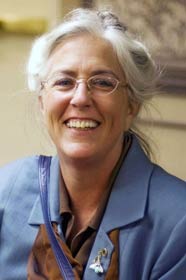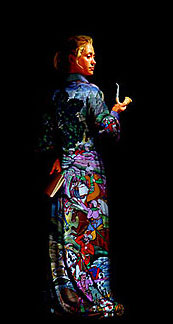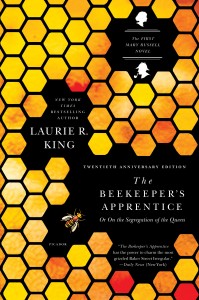Femme Friday: Mary Russell
 Doyle never did tell us what Sherlock Holmes got up to after he retired to a cottage in Sussex, so, much like the Hiatus, that part of his life is a free-for-all for pastiche and fanfiction writers. Whether it turns out that he was Moriarty all along, or slowly succumbs to his addiction, or indeed deteriorates due to dementia – many, many writers have had their wicked way with Holmes-past-fifty.
Doyle never did tell us what Sherlock Holmes got up to after he retired to a cottage in Sussex, so, much like the Hiatus, that part of his life is a free-for-all for pastiche and fanfiction writers. Whether it turns out that he was Moriarty all along, or slowly succumbs to his addiction, or indeed deteriorates due to dementia – many, many writers have had their wicked way with Holmes-past-fifty.
Laurie R. King is no exception. And so, twenty years ago, Mary Russell entered the scene, fifteen years old, with her nose in a book, wandering in the Sussex Downs to escape her overbearing aunt, and literally fell over Sherlock Holmes. What happened next is the subject of a series of, to date, thirteen books.
While it’s not the point of this post to sell the series to you, it very much is the point of this post to tell you about some reasons Russell is awesome – seven, to be precise. So I’ll get started on that without further ado, and leave you to make up your mind as to whether this is a lady you’d like to hang out with.
She’s smart.
When we first meet her, she has her nose in a book because she is studying for the entrance exams at Oxford University. The studying pays off and she eventually graduates with a double degree in theology and chemistry.
From the word go, she is absolutely Holmes’ intellectual equal: when she first encounters him, she deduces him as follows:
“I’d say the blue spots are a better bet, if you’re trying for another hive,” I told him. “The ones you’ve only marked with red are probably from Mr Warner’s chard. The blue spots are farther away, but they’re almost sure to be wild ones.” […]
“How do you come to know of my interests?”
“I should have thought it obvious […] I see paint on your pocket-handkerchief, and traces on your fingers where you wiped it away. The only reason to mark bees that I can think of is to enable one to follow them to their hive. You are either interested in gathering honey or in the bees themselves, and it is not the time of year to harvest honey. Three months ago we had an unusual cold spell that killed many hives. Therefore I assume that you are tracking these in order to replenish your own stock.”
Sherlock Holmes is not the only one who can play this game, and this is only the first of many examples of Russell smarts. I could only ever imagine Holmes being interested in someone if they were on the same intellectual level, and Russell exemplifies that. She subsequently proves herself capable at languages and chess as well as her chosen university subjects.
She’s badass.
There’s a bit of a cliché that you’re meant to not be able to deal with the real world if you’re a very bookish person, but Russell proves this wrong as well. On their first proper case, Holmes and her get followed by a pack of vicious hounds. Holmes is about to unleash a drug on them, but Russell faces them down by shouting at them as you would at a gaggle of naughty children.
 While this is certainly a showpiece that displays that she has powers she is perhaps unaware of (more on that later), I think it can be argued that the way she deals with her living circumstances is badass right in and of itself. Her parents have left her orphaned at a young age, so at the start of the series she is living in a foreign country (she’s of American extraction) with an overbearing relative who doesn’t like her very much. Yet instead of grudgingly accepting her situation, she takes active steps to ensure she can get out of there – and I am sure being a young woman at Oxford University in the 1920s was not much of a piece of cake.
While this is certainly a showpiece that displays that she has powers she is perhaps unaware of (more on that later), I think it can be argued that the way she deals with her living circumstances is badass right in and of itself. Her parents have left her orphaned at a young age, so at the start of the series she is living in a foreign country (she’s of American extraction) with an overbearing relative who doesn’t like her very much. Yet instead of grudgingly accepting her situation, she takes active steps to ensure she can get out of there – and I am sure being a young woman at Oxford University in the 1920s was not much of a piece of cake.
She gets to put Holmes in his place.
Oh, does she ever. Holmes is more of a background figure throughout the series, at least in the early volumes. Russell gets to show him his boundaries, but most of all, she gets to call him on it when he does something unacceptable – one of the early examples in the series is when he deduces her and takes it too far, as he always does, and realises this. After which she lets him finish and then proceeds to take apart his reasoning and point out the flaws.
This is something I greatly miss from the original stories and most adaptations with the notable exception of Elementary (which, in my mind, has more in common with this series than with ACD canon anyway). Here’s a bit from MREG when he has knocked her out “for her own good” – a thing that I think is never okay, and Russell has the same opinion:
I pulled back, and I hit him—nothing fancy, just a good, traditional, lady’s open-handed slap that had all the muscles of my arm behind it. It rattled his teeth and nearly sent him back into the river. I glared furiously at him.
“Never, never do that again!”
“Russell! I did not—”
“Knock me out and leave me behind—Holmes, how could you?”
“There was no time for a discussion,” he pointed out.
“That is no excuse,” I said illogically. “Never even think of doing something like that again!”
Holmes has had a punch in the face about his arsehole tendencies coming since about 1894, but since Watson never quite stepped up to the challenge (at least not until the BBC adaptation came along), I’m glad someone got there.
Don’t get me wrong, I love London and I love the ACD stories, but the furthest Holmes and Watson ever go from London is to other parts of England. Russell and Holmes’ adventures take them to Dartmoor (obligatory stop for any pastiche series), Palestine, America, and India. Next up is Japan, which I’m greatly looking forward to. She adapts to all manner of different social customs and languages with ease (though she relies on a disguise once). She also gets to confront people’s hang-ups about women and her relationship with Holmes, and because she’s younger she gets to do stuff that Holmes isn’t able to do.
Her story continues after the marriage.
It’s not a spoiler to say that Russell and Holmes get married at the end of the second book, because it’s the basis of the conceit of the rest of the series. I’m not going to spend much ink on Mary Sue debates here, but I feel compelled to point out that I really don’t know that many female characters whose stories continue after they get married to whoever it was the plot was setting them up with. For these two, I feel the marriage is more like a socially acceptable excuse from the writer to keep them around each other so that the series can continue. Also, the way it happens at the end of MREG, right after the showdown of the case and after Russell has had to fish Holmes out of the water and given him a decent box on the ears for underestimating her, is one of my favourite marriage proposals in literature. It’s too long to quote but you can find it online.
She grows over the course of the series.
Russell is fifteen when the series starts, but as it continues she grows from an awkward teenager into a capable young woman. She’s a feminist, she gets involved with people on the margins of society despite being a young lady of means, she gets to confronts the ghosts of her own and Holmes’ past, and she gets to develop security in herself. It’s been a pleasure getting through my teens and twenties alongside her, and I’m happy she’s still around now I’ve hit thirty. (She hasn’t yet, the lucky sod.)
She’s one of not very many “female Watsons” I know of.
Watson is everyman, for sure, and if you ask BSB Lyndsay whose shoes she’d want to walk in, it would be Watson’s. In the Canon, definitely, but in the realm of pastiche, I’d slip into Russell’s shoes at any time, although, as mentioned before, Joan Watson from Elementary is some serious competition. They get to hang out with Holmes, but they also get to do their own thing. And every so often, it’s nice to have a character to inhabit and walk alongside that you don’t have to cross gender divides for.
I hope we get to read a few more of Russell and Holmes’ adventures before the author decides she’s had enough of them.
You can also listen to our interview with Laurie R. King from back in the day below!

Ardy is thirtysomething. Librarian. Transplanted German. Anglophile. Lover of tea and scones (and, yes, jam. I also own ridiculous jumpers).

